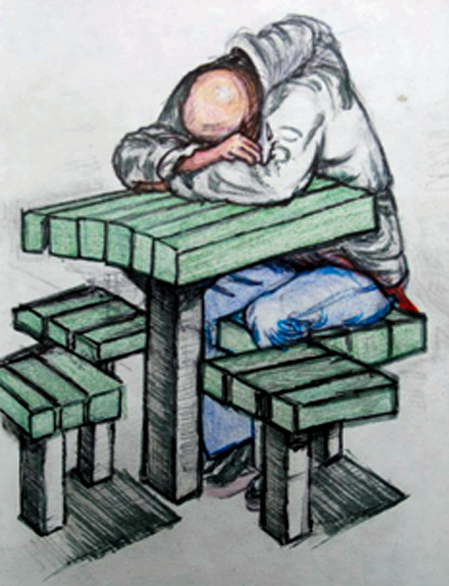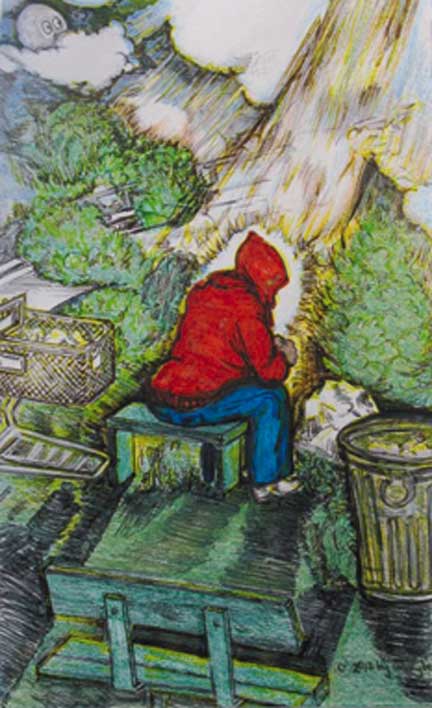The Walkers
by Peter Marin
This poem follows the journey of a small group of homeless men and women as they marched across America from Santa Barbara to Washington, D.C.
No one
when we set out
not even we believed
we’d make it —
thirteen of us
from Santa Barbara
King’s birthday
clouds low on the horizon
the rainy season beginning
trucks on the highway
step by step down the road.
3000 miles one coast to the other
10 months across 2 dozen states
I still remember the feel
of the sun on my face
the hot nights in the midwest
where we bathed at dusk in
farm-ponds. I remember the
bridge over the Mississippi
the storms in Ohio
the leaves underfoot in the east.
I remember the wide turnpikes
narrow roads
how the air thru which we passed
scoured us until we glowed.
I remember how as we climbed
in New Mexico toward the
Continental Divide
the light of the sun came thru the clouds lighting
first one part then another
of the plain we crossed
rising at its furthest edge
to jagged peaks.
At the top of a high pass
rain soaked us
hail bounced at our feet
solitude enveloped us
muting the sounds of the world.
A clarity of light surrounded us
as if we had come suddenly close
to something other than
ourselves.
Later at night
our bickering began again —
the drunken arguments
over money or women or
which roads to take.
But what did it matter?
We slept knowing we had
for a moment
entered another world —
the one we dreamt as children
must be there.
Along the way
we picked up cans sold blood
ate so much surplus cheese
we could not shit for days.
By night we saw flares of gas
by day sight of cities guided us.
In the street people stopped us
tears in their eyes
pressing change in our hands
or lifting in the air V’d fingers
or fists to spur us on.
Men joined us crazed by war
lovers star-crossed
children sent packing
parents abandoned
the poor made homeless when
police tore down their tents
or stamped their fires out.
We saw men arrested for
sleeping on riverbanks
women for wheeling a
shopping cart down the street.
By the light of our fires we
heard men speak of lost children
or the pain of exile
with no hope of return.
In sleep they cried out to us
as do those shipwrecked
driven wild by thirst
who see on the horizon
imagined rescuers.
In huge shelters in great cities
we saw 1000 paupers in unison
turning on cots
like meat on a spit
snow falling outside.
I can recite
culled from our travels
a litany of horrors
a geography of loss.
The grieved faces melt into one
the cities combine skies
become a single huge roof
above a chamber of sorrows
stretching from sea to shining sea.
Ask me now why we did it and
I have no answer. It was not for
housing tho’ we spoke of it.
Nor was it for charity
tho’ we received it.
Nor was it even for justice —
at least not for ourselves.
We began that is all and
before we began
we were nothing.
It was only a dream
a thing we said idly we’d do. And then we were there
on the road no turning back only ourselves to measure
failure or success.
I believe now we crossed
not only the country
but a far region inside where
the soul has its home.
The tall mountains wide plains
were parts of ourselves
discovered in the great
blanketing silences of the land.
I am as you see
still on the streets
no wiser
no more sober than before.
And yet — I tell you I am
not the same.
I once saw in New York
Buddhist monks walk for peace
in stately order solemnly
beating drums:
boom. boom. boom.
They walked as if in
a slow-motion funeral:
boom. boom. boom.
It was like the beating
heart of the world
and when later I heard
they had walked
across the whole nation
in the same way
I cried.
On our walk
we had no drums
we shambled signs on our backs
shopping cart pushed ahead
an American flag held aloft.
No doubt we were comic
or sad in the eyes of
drivers who whizzed by
our brown shabby junk-laden
bus lumbering behind us.
But we too no less than
the monks felt in ourselves
something holy.
We too heard in the beat of
our hearts struggling uphill
the sound of the world:
boom. boom. boom.
Now in my thoughts I dance
as the wind devils did in Texas
I ride the high clouds
as I once rode freights
and I step among stars
like a man crossing a stream
stone to stone without stumbling.
But who will believe it
seeing me familiar on the street
my palm out
a bottle in my hand?
I am on fire with the truth
behind the mask of my face
and yet
mute, mute, mute,
I cannot tell my tale.

Vacancy
by Joan Clair
How can we be housed
and sleep at night
when our brothers have no homes?
How can we be housed
and sleep at night
when our sisters sleep on stones?
What happened to the home
we shared inside God’s heart?
Whatever drove that home to vacancy
drove us apart.
Praising God and Serving One Another
by Leon Kennedy
In God’s eyes, everybody is somebody:
a Shining Star.
Everyone is connected to one another:
One Spirit.
Each person is born with a gift from
God: a calling from the heart
a way of ministering.
Times are stormy and hard for many
of us. Sometimes we wonder,
“How will we make it?”
We need to keep on
praying and praising,
reaching for our dreams,
asking for what we need and want,
knocking until the door opens.
After the storm, the sun always shines.
The stars are always shining, even
when we can not see them.
God has blessings for each one of us,
even when we do not know
how we’ll make it.
God is waiting for us . . .
to lift up our hands,
to have faith in God,
to live God’s will,
to Love and Bless all people,
and to give God all the glory.
May we hold on to
God’s unchanging hands.

Whitman in the Tenderloin
by George Wynn
What would it be like
to sit down with him
— a big dude —
in 49er red and gold
sitting on a milk crate
with boom box blastin’
classic Wicked Pickett:
“I’m gonna take you girl
and hold you,
And do all the things I told you
in the Midnight Hour.”
And the menfolk and
the womenfolk flirt
to the music while others
curse and flirt with the
game of cocaine
Then the police siren
the cruiser stops and
the men in blue with
their long black nightsticks
watch the crowd disperse
and look up at the windows
of antique Tenderloin buildings
and the puzzled faces of Asian
grandmothers and grandfathers
more than likely survivors
of refugee camps
holding their crying babies and
perhaps thinking we never dreamed
our new home would be like this
One block down the street
I spot a slender young man
laying against a wall with
blue felt hat and long
black hair halfway down his back
and brown tanned Indian land skin
he’s centered: piercing eyes
and tender lips his fingertips
highlighting his tome of choice:
Leaves of Grass
“Great book” I say and he
looks up and presses my
hand with his in a firm handshake
and continues to read.

